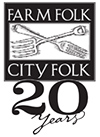2015 enviroFund™ grant recipients
Focus for 2015
The enviroFund supports organizations that support the development of a sustainable, local food system. For Vancity, a strong sustainable food system is one in which sustainable food production, processing, distribution and consumption are integrated to enhance the economic, environmental and social health of our operating regions of Metro Vancouver, Greater Victoria and the Fraser Valley.
In 2015, the enviroFund allocated $700,000 in funding to support three program areas:
1. Targeted Sector Support
Vancity is committed to helping local and organic food businesses grow.In 2015, the enviroFund supported organizations that support the development of sustainable local food businesses, including producers (farmers, fishers), small and medium scale food processors, restaurants and the retail sector. We work with select organizations throughout the year to build their capacity to deliver services to their members in our local communities.
In 2015 we directed our support towards new/young farmers and sustainable local fishers and seafood retailers. The two organizations that we will be working with and funding this year are:

Young Agrarians
Growing New and Young Farmers in BC ($50,000)
Young Agrarians is a network supporting and encouraging new and young ecological and organic farmers in BC. They received core organizational funding and support for their Business Mentorship Network and Land-linking projects. The program funding will help new farmers access available farmland through a land matching system, and will also help them develop the business skills necessary to run financially viable farm businesses.

Living Oceans
Our Fish: Local Sustainable Seafood Assets and Network ($25,000)
Living Oceans works to ensure that Canada's oceans are sustainably managed and thriving with abundant and diverse sea life. Through their Sustainable Seafood initiative, Living Oceans is addressing concerns about how fishing and aquaculture practices are pushing some ocean ecosystems to the brink of collapse. Funding through the enviroFund will highlight and support the sustainable seafood business sector and promote these progressive businesses to consumers.
2. Sustainable Food System Development Initiatives
This program is aimed at providing support for organizations which are focused on developing a viable and sustainable local food system through sector development initiatives. We are interested in supporting organizations to help them build a food system which contributes to a healthier environment, improved individual health, and a more resilient local economy.

BC Food Systems Network
Good Food Solutions: Sustainable Local Food Economies ($25,000)
The BC Food Systems Network operates as a network to build connections, catalyze opportunities, and coordinate activities to advance the mission of creating healthy, just and sustainable food systems in British Columbia. The Good Food Solutions Project funding will focus on advancing innovative public policy, programs and partnerships to better support local small and medium-sized food system enterprises.

The Capital Region Food and Agriculture Initiatives Roundtable (CR-FAIR)
Land Access and New Grower Development ($40,00 - $20,000 Core Funding; $20,000 Program Funding)
CR-FAIR is a coalition of organizations, working in the Capital Regional District, to strengthen regional food security and our local food system, from farm gate to dinner plate. Funding through the enviroFund will support a variety of sector building initiatives in two main areas:
- Supporting land access and new grower development through the establishment of two new incubator farms in conjunction with two municipal partners.
- Regional marketing and distribution capacity development through support for 3 key initiatives: Get Ready Get Local, Flavour Trails, and Farmer2Farmer.

FarmFolk/CityFolk (FFCF)
Meet Your Makers 2.0 & the Vancouver Local Food Hub ($40,000 - $20,000 Core funding; $20,000 Program Funding)
FFCF works to cultivate a local, sustainable food system. Their projects provide access to and protection of foodlands; support local growers and producers; and engage communities in the celebration of local food. Program funding will support local farmers and food businesses through two main projects: Meet Your Maker 2 and the Vancouver Local Food Hub. Meet Your Maker 2 will provide business development opportunities for local food producing businesses by connecting them with local retailers and restaurants, as well as provide business strengthening workshops. The Vancouver Local Food Hub enables our Fraser Valley producers to sell food direct to Metro Vancouver restaurants, markets, and institutions and receive fair prices, supporting our local food economy.

Vancouver Farmers Market
Riley Park Pavilion Permanent Farmers Market ($40,000 - $20,000 Core Funding; $20,000 Program Funding)
Vancouver Farmers Market have been supporting small farm production, nourishing people and connecting neighbours for over 20 years, through their many farmers’ market locations. This project funding will help them raise the capital necessary to secure a permanent year-round farmers market space at the planned Riley Park Pavilion including a plan to develop a ‘mini food hub’ complete with community garden and community cooking space. The Pavilion will be the first space of its kind in Vancouver and will be a model for other regions.

Vancouver Aquarium
Ocean Wise Program ($40,000 Program Funding)
Funding will support the Ocean Wise program expand throughout the Vancity operating area, engaging local retailers and restaurants, and educating consumers in order to protect and conserve local sea life in danger of over fishing. Funding will also help to support a Fisheries Assessment Specialist in conducting sustainability assessments of local Canadian fisheries.This will enable more local fisheries’ products to be classified as sustainable and thus gain entry to the sustainable seafood marketplace.

Vancouver Urban Farming Society, (VUFS)
Supporting Urban Farmers ($40,000 - $20,000 Core funding; $20,000 Program Funding)
VUFS is receiving funding to support a variety of initiatives that help support the development of urban farming, including: tool access and intern enrichment programs, urban farmer workshops, urban farm tours, the annual Vancouver Urban Farming Forum, Vancouver Urban Farming Census, and work on regulatory and policy development to support urban farm businesses.
3. Local Food Project Grants:
This program supports larger-scale projects that are innovative or scalable, will increase local sustainable food production and lead to the growth of this sector.

Asian Environmental Association (HUA Foundation)
The Choi Project - Phase III ($30,000)
The Choi Project III project aims to increase the local Chinese restaurant industry’s procurement and use of seasonal, local and sustainable food. This includes developing a bilingual “start up kit” tailored to Chinese restaurants and promoting local ingredients in their classic, traditional and banquet dishes. Events will be hosted to educate and engage attendees with activities and interactive presentations.

City of Surrey (Economic Development Division)
Virtual Incubator and Agri-Land Linking ($40,000)
The project is aimed at unlocking prime underutilized ALR land and providing easy to understand actionable farm start information for new entrants to the agriculture sector in Surrey and the South of the Fraser region. This includes enhancing the Young Agrarian UMap technology, promoting the web resource and matching ALR landowners with aspiring farmers.

Ecotrust Canada
This Fish Seafood Faceability ($40,000)
Develop and launch an innovative new seafood marketing model called “Faceability” whereby traceable local seafood products are branded with the fish harvester’s name, image and signature. The project encourages traceable, sustainable and locally sourced seafood.

Galiano Conservancy Association
Community Food Forest Phase 2 ($40,000)
This project is the second phase in creating a permaculture food forest, locally adapted, sustainable and high-yielding system that will contribute to and inspire resilient alternatives to conventional agriculture. The aim is to increase impact through education programs, building partnerships and expansion of infrastructure and marketability.

Long Term Inmates Now in the Community Society (LINC)
Reintegration, Restoration, Food Security ($32,000)
Emma's Acres is an agricultural social enterprise that provides offenders with employment skills and re-integration supports as they transition out of prison.It also assists survivors of serious crime and enhances food security in Mission. The project aims to expand food production capacity of the farm.

Meal Exchange
Real Food Challenge BC ($39,000)
The Meal Exchange will bring The Real Food Challenge to colleges and universities in B.C. The goal is to leverage campuses’ purchasing power to develop the market for sustainable agriculture in B.C. The goal is to pilot at 3 campuses.

North Shore Neighbourhood House
Hawker’s Wharf Urban Farm $27,910)
Develop The Hawker’s Wharf Urban Farm on a quarter acre site at the proposed Hawker’s Wharf Food Hub at Harbourside. The Edible Garden Project space will grow produce for farm gate sales and local restaurants. Programs on site will engage community members through workshops and demonstrations.

Potluck Cafe Society
DTES Kitchen Tables ($38,250)
To expand the DTES Food Procurement Group (FPG), a buying group comprised of DTES non-profit food providers to access more affordable, nutritious and local food. The project leverages collective purchasing power and opens up new, untapped purchasing channels to BC and Canadian farmers and growers.
Salt Spring Island Farmland Trust Society
Farm Centre for Food Security ($40,000)
A multi-functional food security hub which will include local food aggregation, processing, distribution, storage and food education. It will increase organic, sustainable food production and food security capacity for the community.

The Sharing Farm Society
Extending Seasons ($31,550)
The project aims to develop and implement farming systems to extend vegetable production in shoulder seasons, specifically to increase late autumn, winter and early spring yields by 50%. An educational component will be integrated into the Richmond Farm School curriculum.

Tsawwassen First Nation
Farm School ($40,000)
The Tsawwassen First Nation (TFN) Farm School project is a collaboration between the TFN and the Institute for Sustainable Food Systems (ISFS) at Kwantlen Polytechnic University (KPU). The school combines sustainable agriculture and traditional indigenous food systems. The program curriculum takes place on traditional TFN lands on a 20 acre farm that includes a traditional medicine garden, a 2 acre fruit orchard, an organic market garden, farm animals and incubator plots for the students that graduate from the program. The project will add 5 acres, increase the number of farmers and the quantity of food harvested and sold.